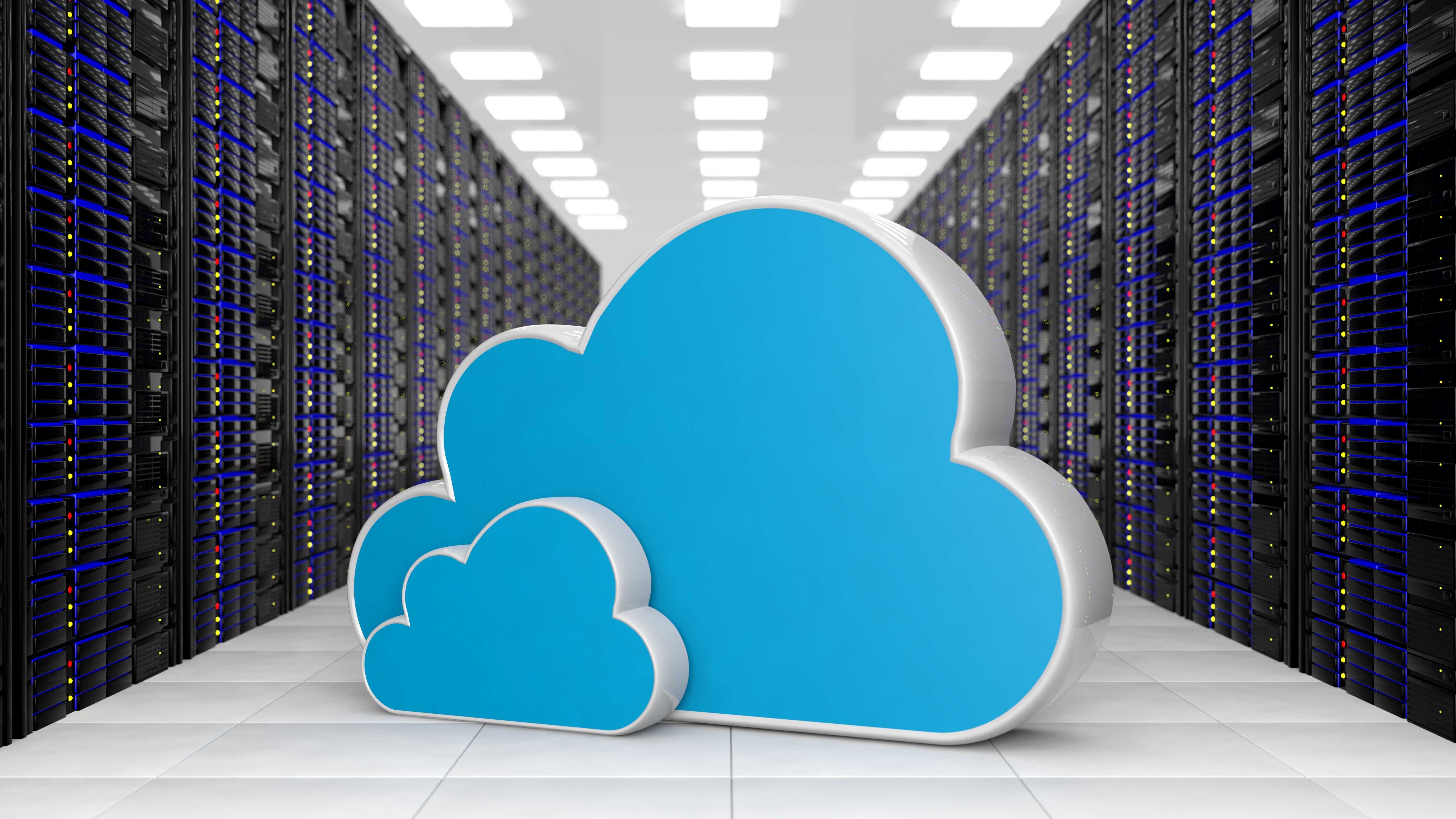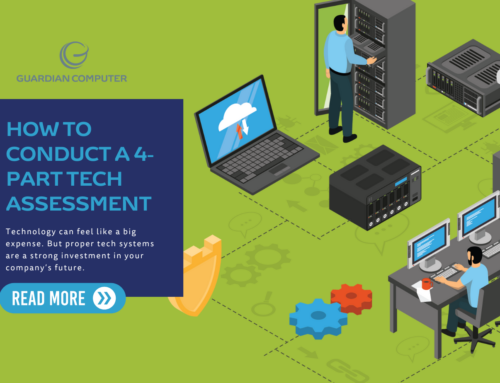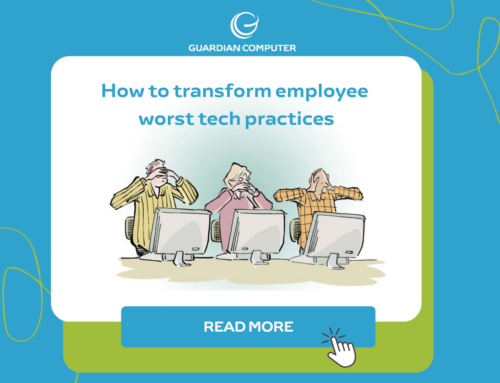Utilizing cloud technology can make a huge impact on the bottom line of your business.
We’re talking about saving your time, your money, and staying safer in an emergency. Every business can get on board with that, right? Even though there are so many positives to using cloud technology, many businesses are hesitant to make the leap. This post is going to cover everything you’ll ever want to know about cloud computing as it relates to your business.
First Things First, What is The Cloud?
We’re sure you’ve probably heard of the cloud or cloud technology by now. Don’t worry, it’s not as intangible of a concept as it may sound. When working with tech companies, you’ll often hear the term “cloud” when talking about storing your data “in the cloud” or “working in the cloud”.
Simply put, the cloud is the software and services that you can access from the Internet rather than locally on your computer. A great example of a cloud service is Google Drive. Instead of storing files on your desktop or laptop, you can create documents on Google Drive and access them from anywhere, on any device, so long as you’re signed into your account.
The Main Uses For The Cloud
In our experience, we see three main uses for the cloud, besides as a storage solution.
- Software-as-a-Service (SaaS). For example, using Salesforce, Box, and Office 365 all use the cloud.
- Infrastructure-as-a-Service (IaaS). This category includes services like Amazon Web Services and Microsoft Azure.
- Platform-as-a-Service (PaaS). This includes services like Google App Engine, AWS PaaS, and Azure PaaS.
What Are the Benefits of Using the Cloud?
The benefits of switching to the cloud can be huge for your business! We know because we help our clients make the transition all the time. The major benefits of using the cloud break down into four categories: cost, power, recovery, and security.
Cloud Technology Cost
Using the cloud helps to remove or reduce the need for an upfront capital investment. That alone can be huge for a business! When using local servers, the costs of maintenance and management are often unpredictable. But, when you use the cloud, the cost of system upgrades, new hardware and software are usually included in cloud provider contracts. Plus, you get the option for services and storage just when you need it. This means you can pay as you go instead of investing all at once.
This last one can be a huge help for small and medium businesses: no extra staff needed. An in-house expert on staff tends to be a high salary position. For big companies, they may need help to maintain servers, storage, and backup/recovery. But, honestly, there is rarely justification for keeping such a person since it doesn’t require a full-time person for a small or medium sized business.
Capacity and Computing Power
When using an in-house solution, you would need to buy more hardware each and every time you needed to increase storage. Now, with cloud technology, businesses of any size can tap into computing resources that were once only available to large corporations.
Cloud computing allows practically unlimited data storage and processing power due to the pooling of computer resources. It provides on-demand scalability that corresponds to a company’s needs so as your applications grow, you can add as much storage, RAM and CPU capacity as needed. Cloud-based applications have the ability to automatically refresh and update, which saves you time and resources.
Backup and Recovery
Private cloud solutions include backups that offer an easier, less resource-intensive method to protecting your data. In fact, most cloud providers distribute backups between data centers to ensure access.
When critical business information is saved on the computer or a server at your office it can be damaged in an emergency situation. In these cases, there is no guarantee that your data is able to be recovered. Utilizing cloud technology solves this problem.
No matter the event, a natural disaster, power failure, or other crisis, the cloud services will provide quick data recovery. For example, having critical data stored in the cloud ensures it is backed up and protected in a secure and safe location. This allows companies to conduct business as usual, minimizing downtime and loss of productivity. When critical business information is saved on a computer or a server at your office it can be damaged in an emergency situation. In these cases, there is no guarantee that your data is able to be recovered.
Enhanced Security
Our cloud is fully managed and secure, which means your data is secure no matter where you access it from. The economies of scale which apply to computer resources also ensure that the best security measures can be put in place with high-level oversight from IT security experts.
The key to this amped-up security is the encryption of data being transmitted over networks and stored in databases. By using encryption, information is less accessible by hackers or anyone else not authorized to view your data. As an added security measure, with most cloud-based services, different security settings can be set based on the user.
How We Protect Our Clients In The Cloud
While most people know that the cloud gives you a lot of flexibility, there are some security concerns if done improperly. We’ve seen concerns such as:
- Theft of data from cloud infrastructures or applications.
- Lack of a plan for GDPR Compliance.
- Cloud providers using data centers in potentially unstable countries.
- Advanced attacks against cloud infrastructure.
At Guardian Computer, we protect the intellectual property, Protected Health Information (PHI), and sensitive data of our clients who use cloud technology. With over 50 years combined in the tech solutions industry, we bring our experience to the table. We help our clients avoid the pitfalls, know the right questions to ask a potential cloud provider, and ensure our clients have a comprehensive plan to migrate to the cloud.
Questions You Should Ask A Potential Cloud Provider
Not all cloud technology service providers are of the same caliber. We have a comprehensive list of questions you should ask before making any decisions on your cloud service provider.
[av_button label=’Download Here’ link=’page,1351′ link_target=” size=’large’ position=’left’ icon_select=’yes’ icon=’ue835′ font=’entypo-fontello’ color=’theme-color’ custom_bg=’#444444′ custom_font=’#ffffff’ admin_preview_bg=” av_uid=’av-1ytyvi’]
Transitioning To Using The Cloud
At Guardian Computer, we help organizations understand how a migration to the cloud is different than what IT administrators are used to deploying in their legacy infrastructure environments. We want our clients to understand what they are getting into, how the process works and what they should expect.
For example, often a business’s infrastructure needs to be upgraded to handle the stress and traffic of a full-scale migration to the cloud. We help organizations develop and execute a plan for the data migration including deciding which applications and datasets need to migrate to and what tools and technologies ease the migration process.
Changing to the cloud can be challenging to start! But is more than worth it for the time and expense your business will save. Want to chat more about cloud technology? Let’s chat!







